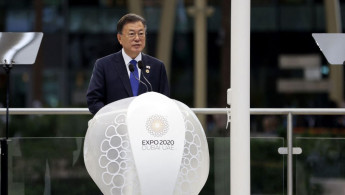UAE, South Korea 'reach $3.5 billion missile deal' during visit by Korean President Moon
The United Arab Emirates reportedly reached a preliminary multibillion-dollar deal to buy South Korean surface-to-air missiles on Sunday, during a trip to the Gulf nation by the president of South Korea, who also pledged deeper cooperation with Abu Dhabi.
After South Korean President Moon Jae-in met Emirati Prime Minister Sheikh Mohammed bin Rashid Al Maktoum in Dubai, the countries signed a memorandum of understanding for the UAE's purchase of a South Korean mid-range missile defense system valued at some $3.5 billion, South Korea's Yonhap news agency reported.
There were no further details on the deal announced during the visit nor immediate comment from the UAE.
But during Dubai's weeklong aviation trade show last November, the Emirati Ministry of Defense tweeted it planned to acquire South Korea's M-SAM, an advanced air defense system designed to intercept missiles at altitudes below 25 miles (40 kilometres).
The ministry said this would "constitute a qualitative addition to the capabilities of the national air defense".
On Monday, Moon vowed to world leaders that his fossil fuel-dependent country and the oil-rich United Arab Emirates would jointly expand their investments in renewable energy to tackle climate change.
During his visit to the UAE, Moon reiterated Seoul's commitment to reach carbon neutrality by 2050, slash methane emissions and boost renewables as the nation known as one of Asia’s biggest greenhouse gas emitters comes under growing pressure to combat climate change.
"Climate change is becoming a stern reality before our eyes," he told officials and business leaders gathered at a sustainable conference in Dubai. "I hope that UAE and South Korea’s hydrogen cooperation will bring forward carbon-neutral, sustainable futures."
South Korea imports fossil fuels from the Persian Gulf, including from Abu Dhabi, to power its manufacturing-dependent economy.
But in public remarks during his trip to Dubai this week, President Moon has largely avoided discussing the nations' deep cooperation in the oil and gas industry, instead stressing their advances in hydrogen technologies and renewables.
South Korean contractors built the UAE’s Barakah nuclear power plant, the first on the Arabian Peninsula and Seoul’s first attempt to build an atomic reactor abroad. The first of four reactors went online in the summer of 2020.
"The license allows using the US financial system to pay compensation to the Iranian private investor," South Korea's foreign ministry said in a statement. 👇https://t.co/FHhNIv24aU
— The New Arab (@The_NewArab) January 13, 2022
As part of Seoul's pivot to greater environmental investments, President Moon said on Monday that South Korea and Abu Dhabi were jointly planning to construct a massive plant that produces hydrogen in the form of ammonia.
South Korea is striving to meet its obligations under the Paris climate agreement despite its outsized reliance on coal for electricity generation.
The UAE became the first nation in the region to promise to have net zero carbon emissions by 2050 — one of many pledges ahead of the UN climate summit last year that remains difficult to assess.
Abu Dhabi has not announced plans to reduce its oil production or fossil fuel exports — a critical source of revenue.
President Moon is set to travel on to Saudi Arabia and Egypt as part of his Middle East tour.





 Follow the Middle East's top stories in English at The New Arab on Google News
Follow the Middle East's top stories in English at The New Arab on Google News
![The UAE is widely suspected of arming the RSF militia [Getty]](/sites/default/files/styles/image_330x185/public/2024-11/GettyImages-472529908.jpg?h=69f2b9d0&itok=Yauw3YTG)
![Netanyahu furiously denounced the ICC [Getty]](/sites/default/files/styles/image_330x185/public/2024-11/GettyImages-2169352575.jpg?h=199d8c1f&itok=-vRiruf5)
![Both Hamas and the Palestinian Authority welcomed the ICC arrest warrants [Getty]](/sites/default/files/styles/image_330x185/public/2024-11/GettyImages-2178351173.jpg?h=199d8c1f&itok=TV858iVg)